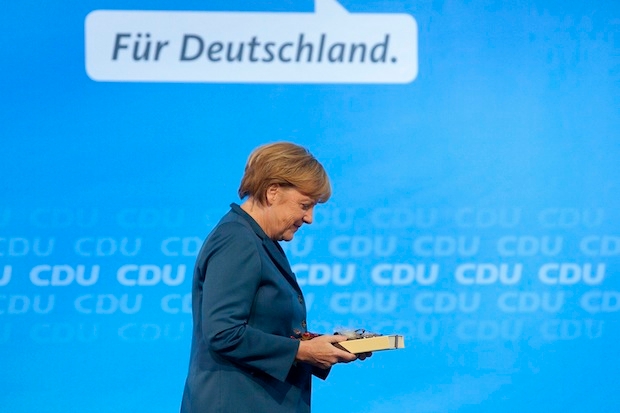[audioplayer src=”http://traffic.libsyn.com/spectator/Untitled_2_AAC_audio.mp3″ title=”Anne Applebaum, Matthew Parris and John O’Sullivan discuss Ukraine”]
Listen
[/audioplayer]For the first time in many years, the eyes of the world are on Crimea. As Russian troops violated Ukrainian sovereignty, the question swiftly became, ‘What can we do?’ If the answer is ‘not very much’, then we ought at least to consider why that is the case. Part of the answer is our diminished military capabilities and ambitions, the inevitable result of reducing the defence budget. But this week our diplomatic tools seem to have failed us. We urgently need to ask: what has gone wrong?
Intent on being seen to do something, the Prime Minister at first warned that British officials might boycott the Paralympics at Sochi. Then the Foreign Secretary insisted on a meeting of the UN Security Council — a body on which Russia not merely sits, but has a veto. The dearth of further concrete ideas were exposed to the world thanks to the Prime Minister’s deputy national security advisor walking into Downing Street with Britain’s policy options in his hand, exposed to the world.
Such amateurism is embarrassing. But it is positively Bismarckian compared to what has gone on ‘above’, at the level of the European Union. If the people of Ukraine are indeed being pulled between the orbits of Russia and Europe, then never mind Westminster — who speaks for Europe?
There was a time when William Hague or David Cameron could be expected to decide British policy in our strategic and moral interests and for other European states to do likewise. But the creation of supra-governmental layers of diplomacy has added elements of confusion and competition that are starting to have the opposite of their intended effect, which was to make misunderstanding and confrontation less likely.
In recent weeks, the idea of a common European Union foreign policy has not merely been tested, but tested to destruction. Perhaps sending the EU’s high representative, Catherine Ashton, to resolve any dispute should always be deemed an act of provocation. But nowhere has her uselessness been more obvious than in the stand-off over Ukraine. Who does she speak for? Who do those Ukrainians who pivot to Europe think she speaks for? Who does Vladimir Putin think she speaks for?
Visiting Kiev immediately after the overthrow of Ukraine’s elected president, the Baroness not only took it upon herself to embrace the controversial former leader Yulia Tymoshenko, but she went on to announce the need for a £19 billion bailout which MPs back home immediately, and rightly, rejected. She was, of course, elected precisely because she is so insignificant a figure — which suited the various European leaders who did not want a Blair-style chief eclipsing them on the world stage. But going through with a charade of EU diplomacy has ended up endangering Ukraine, as it led Putin to believe the West had lost its senses.
Just as the Argentinians were encouraged to invade the Falklands by the idea that there would be no concerted or meaningful response, so Putin’s behaviour has been driven in part by the knowledge that in Ukraine he is involved in a tug-of-war in which the other side — the EU — cannot be bothered to tug. This presents him with an obvious strategic advantage.
Barack Obama’s White House and State Department have spent recent years encouraging the EU machine to take on the role of state craft once practised not just by the United States but by the sovereign nations of Europe. Yet as the White House is beginning to realise, an inherent problem exists. How could a 27-member union ever have a common security and foreign policy? In the end, EU policy always ends up representing the interests of Germany, which is spending so many billions keeping the euro show on the road. And Germany’s economy is powered by Russia, insofar as Berlin depends on the Kremlin for half of its gas imports. So Germany’s priorities will necessarily be different to those of Britain, which is less economically compromised.
The White House seems to have concluded that its primary error in dealing with Ukraine was to devolve diplomacy to the EU. There is another factor, too. America’s energy revolution — chiefly caused by the advances in shale gas — means that it is now on course to be energy independent within the next two decades. Every year, the US grows less dependent on dictatorial regimes which engage in brutal pipeline politics. America has not yet worked out how to use this to its advantage. But if it wanted to really hurt Putin it need only grant more energy export licences, which would reduce the world price of gas.
On entering office, Barack Obama moved to ‘reset’ relationships with Russia — granting the diplomatic equivalent of a plenary indulgence for Putin’s past transgressions. As we now know, this served to further embolden the Kremlin and imperil its former colonies. It is time now to reset again the way in which the West deals with Russia — this time leaving out the fantasy of ‘EU’ diplomacy.
Putin only understands clarity and action, and he has seen neither from the West so far. The aborted experiment of pooled diplomacy in no small part led to this mess. It is time for nation states to clean it up.






Comments